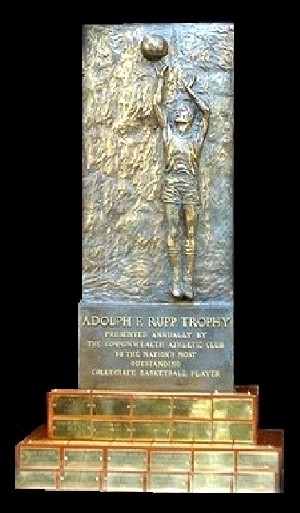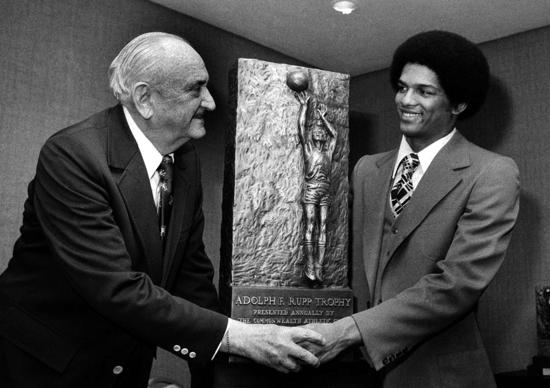![]()
![]()
Background
 |
The award was patterned after football's Heisman trophy, which is presented to the outstanding college football player by New York's Downtown Athletic Club.
Adolph Rupp: The Coach
Adolph Rupp was an important bridge between the pre-modern era and the game of basketball as we know it today. Growing up in the state of Kansas, he attended the University of Kansas in the early 1920's where he was a member of two Jayhawk teams which later were awarded the Helms title as the best team that season. He was coached by Forrest "Phog" Allen, one of the greatest coaches in the first half of the century and while in Lawrence, also came to know James Naismith, the inventor of the game.
Rupp went on to coach high school basketball in Iowa and Illinois before being named as the head coach of the University of Kentucky in 1930, a position he held until his retirement in 1972. While at Kentucky, Rupp amassed an unprecedented 876 wins and 190 losses while winning 27 SEC titles, one NIT Championship and four NCAA Championships (1948, 1949, 1951 and 1958).
Rupp was an important innovator and promoter of the game. He was an early adopter of taking his teams across the country to play high-profile match-ups against nationally recognized schools, and in the process made Kentucky a household name in college basketball circles. Games in Madison Square Garden and other arenas helped to popularize the sport throughout the nation. He brought big-time college basketball to the South, and forced the remainder of the Southeastern Conference and beyond to recognize the potential of basketball as a revenue sport.
Rupp played an important role in helping the development of a national tournament and standardized rules interpretations throughout the country. He was a strong proponent of international play and development. Not only active in the Olympic games and basketball committee, Rupp often traveled internationally to promote the game of basketball through clinics and other international events. Rupp also was an active supporter of youth basketball, such as the Biddy Basketball and Junior Pro movements along with the development of high school basketball, especially in the state of Kentucky.
Rupp was named National Coach of the year four times and SEC Coach of the year seven times. When he retired from his position as head coach at Kentucky, he was the all-time winningest basketball coach in college basketball. He still holds the record for highest winning percentage for coaches with at least 500 career victories.
The Last Hurrah
New York - The old man, his fading life flashing before him, leaned forward and looked away, trying to mask his emotions. Adolph Rupp, college basketball's winningest coach, was being destroyed by opponents with no respect for his cunning - cancer and diabetes. He only had a few months left, and he knew it. Now, his concern was his legacy. "Son, more than anything, I want that trophy to be what I'm remembered for. Every year, I want them to know that the award for the best player in the country is named after me." Rupp was talking about the trophy named for him, which each year is awarded to the Associated Press college basketball player of the year. He permitted his name to be connected with the award only after an expensive, bronze trophy had been purchased and after he was assured every effort would be made to create basketball's equivalent to football's Heisman Trophy. Two years ago, Rupp went to a banquet at Indiana University, a hated rival during his 42 years as coach at the University of Kentucky, to present his trophy to Scott May. The audience was not interested in being reminded of the times Rupp teams had defeated the Hoosiers, but Rupp reminded them anyway. Then, he added, "A few years ago a group of people decided they wanted college basketball to have its own Heisman Trophy. Of course, they named it for me." He meant it. (From The Burlington (NC) Daily Times-News, December 13, 1977.) |
Despite being ill, Rupp had made a special effort to travel to New York City to award the trophy to UCLA's Marques Johnson, as he had awarded other recipients their trophies in the past.
Cancer took Rupp, but not his memory By Ken Rappoport NEW YORK (AP) - He wasn't wearing his brown suit. "This is a special occasion," Adolph Rupp said. "I thought I'd wear something different for a change." That pristine brown suit had carried him through a lot of hard times, he said. But after all, it was only a symbol. "I wear other colors, as long as it's not a basketball game," the jowly Rupp reflected in that familiar gravelled voice, then managed a wan smile. That night, he wore distinguished blue, cutting an impressive figure. He was one of those substantial men who commanded the attention of a room without seeming to try. When Rupp moved, everyone watched. When he spoke, everyone listened. It was an obvious exertion, though, on his part to do both in his condition. The man was dying of cancer, and everyone in the room knew it. "In my condition, you know, I don't get around too well any more," said Rupp. "I guess you've heard about my illness." There was a disquieting pause. This was last March, when the well-known basketball coach visited New York City to present a trophy in his name to The Associated Press Player of the Year in college basketball. Rupp was giving the newly-christened prize to UCLA's Marques Johnson but in reality was the center of attention himself. "Have you seen the trophy?" Rupp asked a visitor, puffing out his chest and pointing to a copper-colored piece standing in the corner of the crowded hotel room. "They're going to have to have four guys carry it back for Marques. It's too heavy for any one man." Someone in the room said out of Rupp's earshot: "We wanted him to see the trophy this year, especially. It's important, you know, that he see it now ... very important. It means so much to him." ......... It was a basketball banquet and his audience savored Rupp's words. After thirty minutes, one of his companions said, "I think maybe Adolph is getting too tired to talk any more." It was a signal to say goodbye. Roughly eight months after that interview, Rupp died in a Lexington hospital. On Saturday night, when the slow torture of cancer finally was over for him, an interviewer recalled some of his last words. "It was all very satisfying you know," Rupp had said of his career. "There was something wonderful in it." Then, the gesture of goodbye. "Thank you for listening to me," he said, waving his arm as he waited for his companions to help him get undressed. "No," his interviewer replied on the way out the door. "Thank you. Than you, Coach." (Printed in the Long Beach Press Telegram, December 13, 1977.) |
 |
![]()
Past Award Winners
Past award winners have included standouts Bill Walton, David Thompson, Larry Bird, Ralph Sampson, Michael Jordan, David Robinson, Shaquille O'Neal, Christian Laettner, Tim Duncan among others. The only multi-year winners were three-time winner Bill Walton of UCLA, three-time winner Ralph Sampson of Virginia and two-time winner J.J. Redick of Duke. No University of Kentucky player had ever won the trophy, until John Wall in 2010.
| Year | Player | School |
|---|---|---|
| 1972 | Bill Walton | UCLA |
| 1973 | Bill Walton | UCLA |
| 1974 | Bill Walton | UCLA |
| 1975 | David Thompson | NC State |
| 1976 | Scott May | Indiana |
| 1977 | Marques Johnson | UCLA |
| 1978 | Butch Lee | Marquette |
| 1979 | Larry Bird | Indiana State |
| 1980 | Mark Aguirre | DePaul |
| 1981 | Ralph Sampson | Virginia |
| 1982 | Ralph Sampson | Virginia |
| 1983 | Ralph Sampson | Virginia |
| 1984 | Michael Jordan | North Carolina |
| 1985 | Patrick Ewing | Georgetown |
| 1986 | Walter Berry | St. John's |
| 1987 | David Robinson | Navy |
| 1988 | Hersey Hawkins | Bradley |
| 1989 | Sean Elliott | Arizona |
| 1990 | Lionel Simmons | La Salle |
| 1991 | Shaquille O'Neal | LSU |
| 1992 | Christian Laettner | Duke |
| 1993 | Calbert Cheaney | Indiana |
| 1994 | Glenn Robinson | Purdue |
| 1995 | Joe Smith | Maryland |
| 1996 | Marcus Camby | UMass |
| 1997 | Tim Duncan | Wake Forest |
| 1998 | Antawn Jamison | North Carolina |
| 1999 | Elton Brand | Duke |
| 2000 | Kenyon Martin | Cincinnati |
| 2001 | Shane Battier | Duke |
| 2002 | Jason Williams | Duke |
| 2003 | David West | Xavier |
| 2004 | Jameer Nelson | Saint Joseph's |
| 2005 | J. J. Redick | Duke |
| 2006 | J. J. Redick | Duke |
| 2007 | Kevin Durant | Texas |
| 2008 | Tyler Hansbrough | North Carolina |
| 2009 | Blake Griffin | Oklahoma |
| 2010 | John Wall | Kentucky |
| 2011 | Jimmer Fredette | Brigham Young |
| 2012 | Anthony Davis | Kentucky |
| 2013 | Victor Oladipo | Indiana |
| 2014 | Doug McDermott | Creighton |
| 2015 | Frank Kaminsky | Wisconsin |
Link to the official Adolph Rupp Trophy website.
![]()
Return to Kentucky Wildcat Basketball Page.
Page written by Jon Scott. Please with any corrections or additional information.